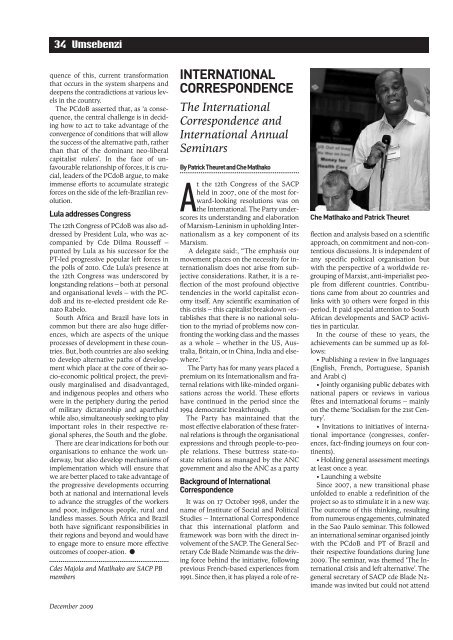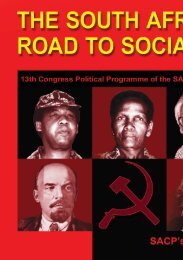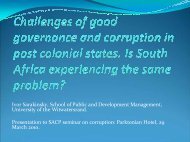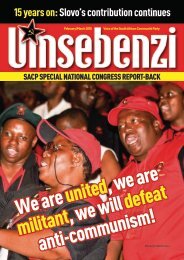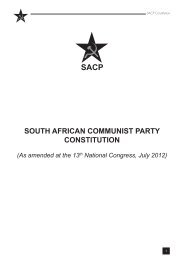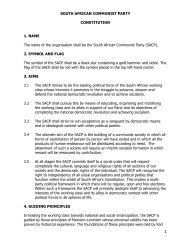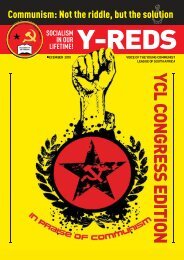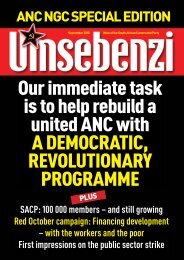Forward to Socialism!! - South African Communist Party
Forward to Socialism!! - South African Communist Party
Forward to Socialism!! - South African Communist Party
You also want an ePaper? Increase the reach of your titles
YUMPU automatically turns print PDFs into web optimized ePapers that Google loves.
34 Umsebenzi<br />
quence of this, current transformation<br />
that occurs in the system sharpens and<br />
deepens the contradictions at various levels<br />
in the country.<br />
The PCdoB asserted that, as ‘a consequence,<br />
the central challenge is in deciding<br />
how <strong>to</strong> act <strong>to</strong> take advantage of the<br />
convergence of conditions that will allow<br />
the success of the alternative path, rather<br />
than that of the dominant neo-liberal<br />
capitalist rulers’. In the face of unfavourable<br />
relationship of forces, it is crucial,<br />
leaders of the PCdoB argue, <strong>to</strong> make<br />
immense efforts <strong>to</strong> accumulate strategic<br />
forces on the side of the left-Brazilian revolution.<br />
Lula addresses Congress<br />
The 12th Congress of PCdoB was also addressed<br />
by President Lula, who was accompanied<br />
by Cde Dilma Rousseff –<br />
punted by Lula as his successor for the<br />
PT-led progressive popular left forces in<br />
the polls of 2010. Cde Lula’s presence at<br />
the 12th Congress was underscored by<br />
longstanding relations – both at personal<br />
and organisational levels – with the PCdoB<br />
and its re-elected president cde Rena<strong>to</strong><br />
Rabelo.<br />
<strong>South</strong> Africa and Brazil have lots in<br />
common but there are also huge differences,<br />
which are aspects of the unique<br />
processes of development in these countries.<br />
But, both countries are also seeking<br />
<strong>to</strong> develop alternative paths of development<br />
which place at the core of their socio-economic<br />
political project, the previously<br />
marginalised and disadvantaged,<br />
and indigenous peoples and others who<br />
were in the periphery during the period<br />
of military dicta<strong>to</strong>rship and apartheid<br />
while also, simultaneously seeking <strong>to</strong> play<br />
important roles in their respective regional<br />
spheres, the <strong>South</strong> and the globe.<br />
There are clear indications for both our<br />
organisations <strong>to</strong> enhance the work underway,<br />
but also develop mechanisms of<br />
implementation which will ensure that<br />
we are better placed <strong>to</strong> take advantage of<br />
the progressive developments occurring<br />
both at national and international levels<br />
<strong>to</strong> advance the struggles of the workers<br />
and poor, indigenous people, rural and<br />
landless masses. <strong>South</strong> Africa and Brazil<br />
both have significant responsibilities in<br />
their regions and beyond and would have<br />
<strong>to</strong> engage more <strong>to</strong> ensure more effective<br />
outcomes of cooper-ation.<br />
Cdes Majola and Matlhako are SACP PB<br />
members<br />
INTERNATIONAL<br />
CORRESPONDENCE<br />
The International<br />
Correspondence and<br />
International Annual<br />
Seminars<br />
By Patrick Theuret and Che Matlhako<br />
At the 12th Congress of the SACP<br />
held in 2007, one of the most forward-looking<br />
resolutions was on<br />
the International. The <strong>Party</strong> underscores<br />
its understanding and elaboration<br />
of Marxism-Leninism in upholding Internationalism<br />
as a key component of its<br />
Marxism.<br />
A delegate said:, “The emphasis our<br />
movement places on the necessity for internationalism<br />
does not arise from subjective<br />
considerations. Rather, it is a reflection<br />
of the most profound objective<br />
tendencies in the world capitalist economy<br />
itself. Any scientific examination of<br />
this crisis – this capitalist breakdown -establishes<br />
that there is no national solution<br />
<strong>to</strong> the myriad of problems now confronting<br />
the working class and the masses<br />
as a whole – whether in the US, Australia,<br />
Britain, or in China, India and elsewhere.”<br />
The <strong>Party</strong> has for many years placed a<br />
premium on its Internationalism and fraternal<br />
relations with like-minded organisations<br />
across the world. These efforts<br />
have continued in the period since the<br />
1994 democratic breakthrough.<br />
The <strong>Party</strong> has maintained that the<br />
most effective elaboration of these fraternal<br />
relations is through the organisational<br />
expressions and through people-<strong>to</strong>-people<br />
relations. These buttress state-<strong>to</strong>state<br />
relations as managed by the ANC<br />
government and also the ANC as a party<br />
Che Matlhako and Patrick Theuret<br />
Background of International<br />
Correspondence<br />
It was on 17 Oc<strong>to</strong>ber 1998, under the<br />
name of Institute of Social and Political<br />
Studies – International Correspondence<br />
that this international platform and<br />
framework was born with the direct involvement<br />
of the SACP. The General Secretary<br />
Cde Blade Nzimande was the driving<br />
force behind the initiative, following<br />
previous French-based experiences from<br />
1991. Since then, it has played a role of reflection<br />
and analysis based on a scientific<br />
approach, on commitment and non-contentious<br />
discussions. It is independent of<br />
any specific political organisation but<br />
with the perspective of a worldwide regrouping<br />
of Marxist, anti-imperialist people<br />
from different countries. Contributions<br />
came from about 20 countries and<br />
links with 30 others were forged in this<br />
period. It paid special attention <strong>to</strong> <strong>South</strong><br />
<strong>African</strong> developments and SACP activities<br />
in particular.<br />
In the course of these 10 years, the<br />
achievements can be summed up as follows:<br />
• Publishing a review in five languages<br />
(English, French, Portuguese, Spanish<br />
and Arabi c)<br />
• Jointly organising public debates with<br />
national papers or reviews in various<br />
fêtes and international forums – mainly<br />
on the theme ‘<strong>Socialism</strong> for the 21st Century’.<br />
• Invitations <strong>to</strong> initiatives of international<br />
importance (congresses, conferences,<br />
fact-finding journeys on four continents).<br />
• Holding general assessment meetings<br />
at least once a year.<br />
• Launching a website<br />
Since 2007, a new transitional phase<br />
unfolded <strong>to</strong> enable a redefinition of the<br />
project so as <strong>to</strong> stimulate it in a new way.<br />
The outcome of this thinking, resulting<br />
from numerous engagements, culminated<br />
in the Sao Paulo seminar. This followed<br />
an international seminar organised jointly<br />
with the PCdoB and PT of Brazil and<br />
their respective foundations during June<br />
2009. The seminar, was themed ‘The International<br />
crisis and left alternative’. The<br />
general secretary of SACP cde Blade Nzimande<br />
was invited but could not attend<br />
December 2009


